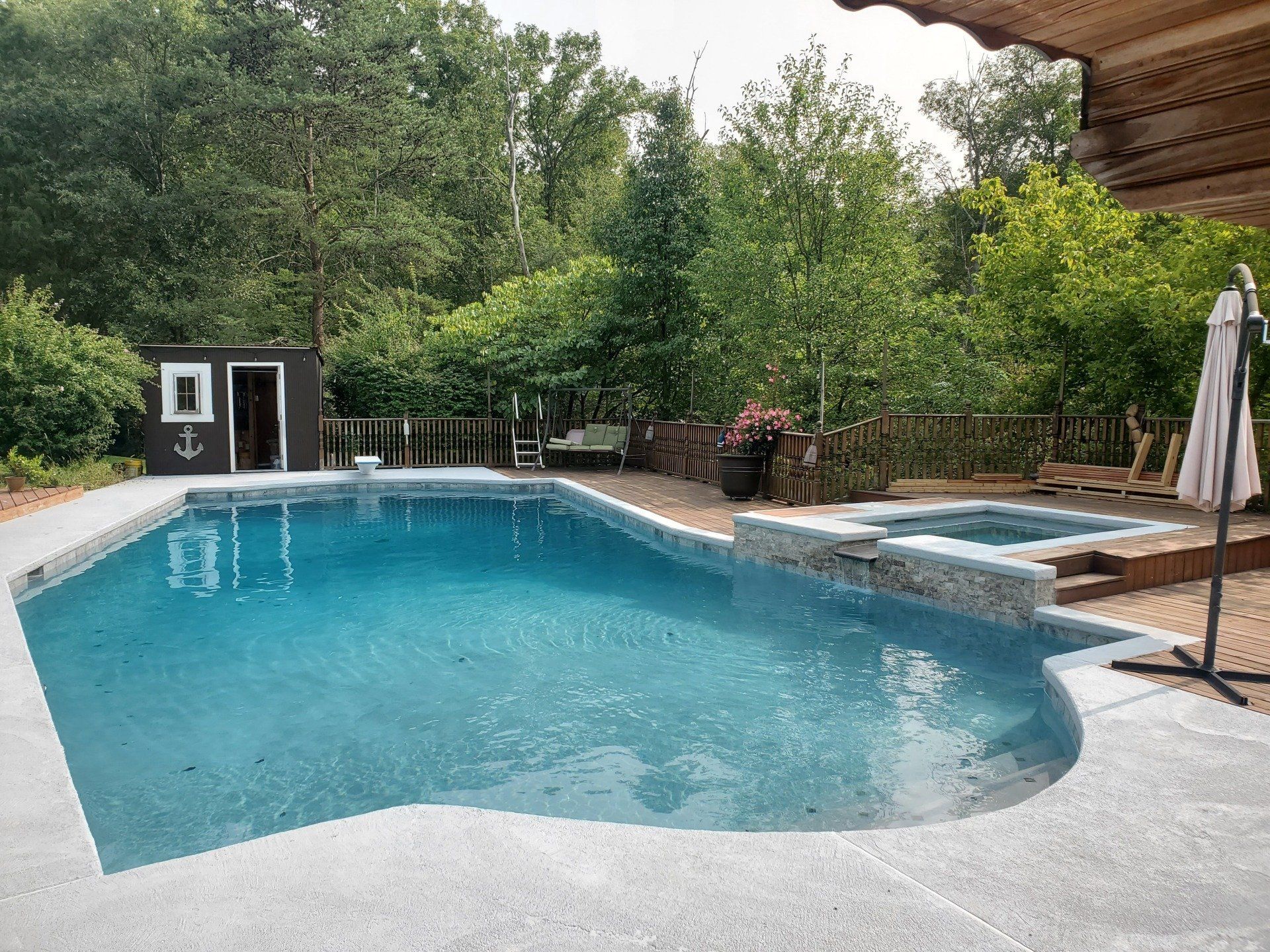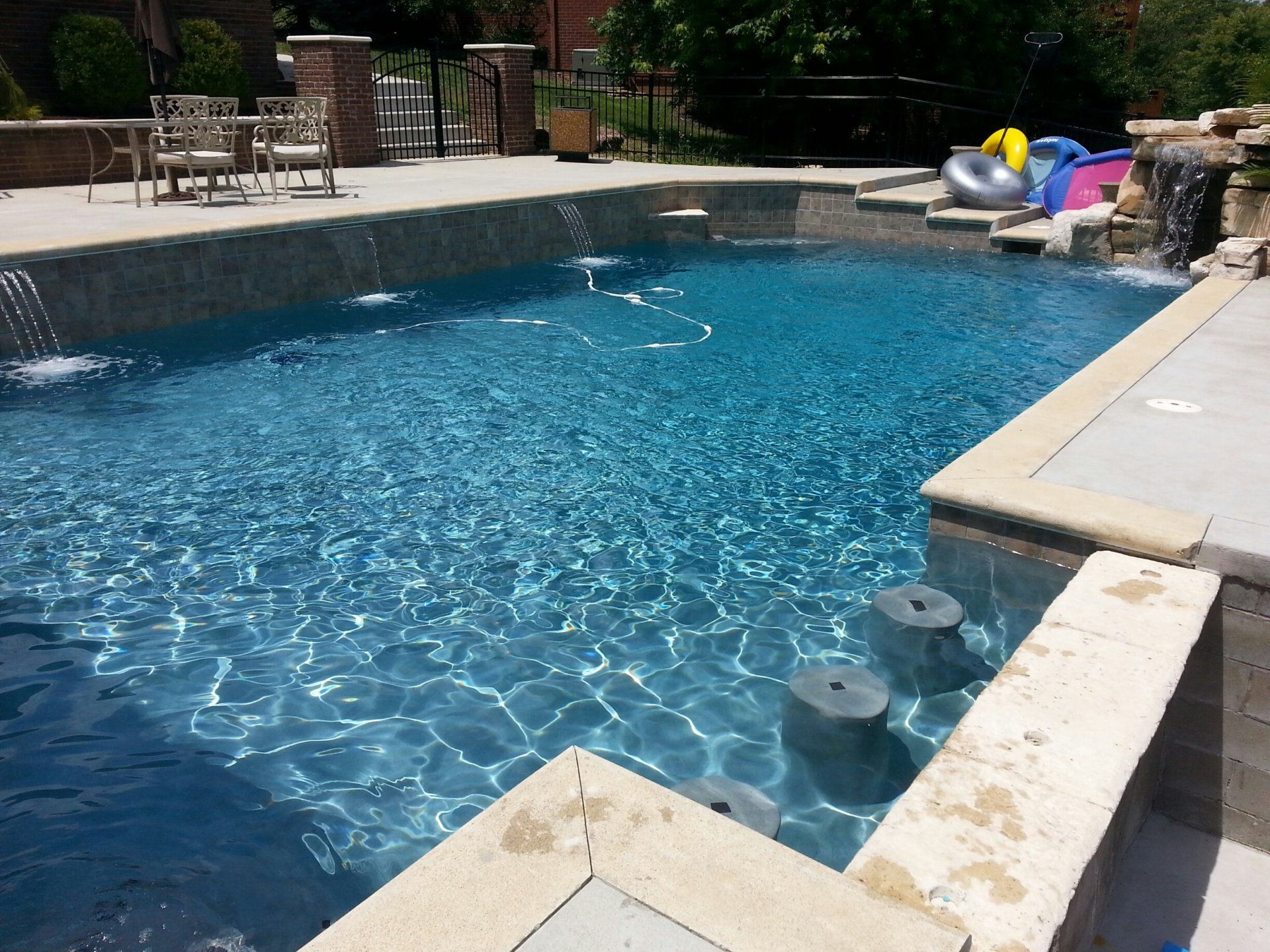THE GUNITE BLOG
Make informed decisions with our in-depth info on gunite pools.

By Sam McAdams
•
17 Jan, 2022
After a long winter, what better place to enjoy the summer sun than in your own backyard, lounging around a beautifully custom-designed and custom-built Gunite Pool. You have probably heard of a gunite swimming pool if you are a lover of pools or enjoy the popular shows of custom gunite pools being built. Gunite pools have always been the go-to construction method for commercial spaces and custom homes due to their durability and limitless customization options. Most people have heard of a gunite or shotcrete pool but don’t know what they are, how they are built or the differences between the two. gunite and shotcrete are pneumatically placed concrete. They are both made of: Fine sand Cement Small pea gravel And fly ash Gunite is a dry mix, and water is added at the nozzle as its being sprayed onto walls. The high pressure air both helps spray the gunite and helps the mixture dry very hard and dense. Shotcrete has the same ingredients but come to the site as a premixed concrete. It is also sprayed with high pressure air to help build, stack and shape the new pool walls, floor and features. No matter if your builder is using the wet or dry method of pool installation, it will most often be referred to as a gunite pool a s that is the term most people are familiar with. Both methods of installation are equally strong and durable. How Is a Gunite Pool Constructed? Gunite pools follow a standard workflow that includes design, the actual build and adding finishing touches. Let's walk through the entire process: Decide on Design: Decide on a design that is right for you and your family and friends that you’ll have over for get togethers. Form and Dig Pool: Once a design is agreed upon your builder will lay out the shape of the pool on the ground by staking it out for the digger to come in and dig the hole for the pool. Next a four inch layer of gravel will be put into the bottom of the hole to help keep the bottom dry. Run Plumbing: Next the plumbing go’s in. you’ll have your skimmers, main drains and return line for the filtration of the pool installed. Gunite pools are always and if not should always be plumbed using schedule 40 PVC piping. Place Rebar: After the plumbing is in the rebar go’s in. Rebar is a steel rod. it comes in many sizes but for most normal Gunite pools 3/8” and 1/2” diameter rebar is used. Spaced one foot on center at an minimum in order to provide a strong structure. Apply Gunite Application: Once the rebar is in its time to apply the Gunite. It takes Highly trained and experienced employees to spray the Gunite onto the rebar and the to shape the Gunite pool shell. Place Pool Tile: After the Gunite shell is in place your halfway there to having a new pool. Next comes the installation of the frost proof pool tile to go around the top six inches of the perimeter of the pool. There are many beautiful colors and tile to choose from. This process also takes a skilled professional. Install Pool deck: Now its time for the installation of your pool deck. You can choose a concrete pool deck. This can be stamp concrete which simulates natural stone or it can be a broom finish concrete which is more affordable of the two. You may also choose to go with a pool coping and pavers such as travertine to add more natural beauty to you project. Apply Pool Plaster: After the pool deck is complete your ready for the interior finish of your new Gunite pool. The shell of a Gunite pool is rough and an interior plaster will need to be chosen and applied to the entire exposed surface of the Gunite walls and floor. This is to make the surface smooth to the touch and gives the pool it’s water tight seal. Marcite or marble lite as some people refer to it, is a 2:1 mixture of white cement and crushed marble. It is troweled on to the pool surface 3/8" to 1/2" inch thick and troweled to a smooth surface providing a durable long lasting surface. If Marcite is used for your final interior surface than the professionals that applied it will start the water the same day the plaster is applied. Other Pool Finishes There are many other pool finishes on the market today and most consist of exposed aggregate finishes. One of the most commonly used exposed finishes in the Cincinnati area is Diamond Brite. There are many colors to choose from and you should be thinking about the color you want your water to be when you pool is filled up and running. If You want your water to be a light sky blue color than you will be happy with Marcite or blue, cool blue and any of the other Diamond Brite that have no dyes added. If you want your water to be more of a Mediterranean deep dark blue, than you need to consider one of Diamond Brite Water colors like cobalt or steel blue. The Diamond Brite is applied the same way as Marcite. It’s troweled on 3/8" to 1/2" inch thick and troweled to a smooth finish. After the Diamond Brite is finished the applicators will have to come back the next day to acid wash pool to expose the colored aggregate in the Diamond Brite. Once the acid wash is complete the water can be started. Once pool is filled normally half way up the pool tile. Your pool builder can come back adjust chemicals and start up your filtration system. Your Gunite pool is now complete, ready to swim in and enjoy for generations.

By Sam McAdams
•
17 Jan, 2022
Choosing to install a pool on your property is a fun and exciting decision! Before you inflate those pool loungers and tubes, it is important to do your research to ensure that you are choosing the right pool for your home. Pools are a great way to boost the property value and functionality of your home. While they are an incredibly valuable asset, they are also a long-term commitment that should be well thought out before you make a purchase. A well-designed pool can instantly transform your home and yard into a personal oasis, providing a variety of options to kick back and relax, or to entertain your friends and family. With the right plan, a pool is a wonderful investment for your home, but how do you decide which pool is right for you? Your first big decision will be this: gunite pools vs. vinyl . Gunite and vinyl are the standard materials that are used to build pools today, and deciding which one would be best suited for your home comes down to a few key factors. In this article we will review some of the most important elements of each type of pool, and how to determine which would be best suited for your home and family. Vinyl Pools Vinyl pools are made with customized sheets of vinyl that line the interior of a pool. A vinyl sheet is placed over the concrete floor of the pool to provide a comfortable surface for swimmers to stand and walk on. Vinyl pool liners come in a variety of colors and designs, and provide lots of versatility. The Pros Many homeowners select vinyl pools because of their low upfront installation cost and their soft, smooth surfaces that are perfect for children or those with more sensitive feet. They can be assembled to fit virtually any size or shaped pool, and can even be used to create unique features such as a bench, sun deck, or swim-out. Vinyl pools also have a very quick turnaround time, and with a skilled craftsman, can be completed in just a couple of weeks. This is a good option for those who are looking to install a pool quickly and on a budget. The Cons While working with vinyl is a cost-effective way to install a pool, it does come with its fair share of disadvantages that should be taken into consideration. Vinyl pool liners are more prone to damage and leaks, so it is important to treat your pool with care to extend its lifespan and reduce the need for extensive repairs. Even with the best care, vinyl pool liners will typically need to be replaced every 7-15 years, depending on the amount of activity it endures each year. Pool owners should expect to spend approximately $5,000 to replace these liners, so while the upfront cost is lower, it is important to consider the ongoing cost of maintaining your pool. Gunite Pools Gunite pools are made using a mixture of concrete, water, and sand that is sprayed over the base of the pool. They offer unlimited options when it comes to shape, size, design, and interior finish. They are fully customizable to bring your dream pool to life. Gunite pools can include bars, benches, and sun decks, and allow for lots of flexibility and versatility to suit your needs. The Pros Simply put, gunite pools are built to last. They can be fully customized using the materials and design of your choice, and are constructed using incredibly durable materials that can stand up to consistent use for many years. They provide the most longevity, and even come with the best warranties compared to their counterparts. The sky is truly the limit when it comes to designing a gunite pool, which makes them a perfect investment for your forever home. The Cons While gunite pools are the most durable, flexible option, they are not suited for every family. One downside, depending on your budget, could be the upfront cost of installation. Gunite pools do have a significantly higher price point, but it is important to consider that you do get what you pay for. They are constructed for long-term use, and are made to stand up to harsher conditions and frequent use. Gunite pools are not suitable for homeowners who are looking to have a pool up and running quickly. Since the concrete takes some time to fully cure before the builders can continue and complete the construction, gunite pools will require approximately one month to allow the molecules to bond together properly. While this can seem like an inconvenience, it will certainly pay off in the long run. Care and Maintenance of Vinyl and Gunite Pools Since areas such as Ohio, Kentucky, and Indiana experience cold winter climate, it is important to note that both vinyl and gunite pools can be winterized, which is an important step to protect your pool and extend its lifespan. Like any other part of your home, both gunite and vinyl pools will require some upkeep and maintenance over time. No matter which material you use, maintaining the water chemistry is crucial for the health and safety of swimmers, and the integrity of the pool. Since gunite is slightly more susceptible to algae accumulation, it is important to use the appropriate chemicals to keep algae at bay. Which Is the Better Option: Gunite of Vinyl? Vinyl pools are a good option for families who are looking for a quick, cost-effective way to install a pool on their property. While they do come with a lower initial cost, it is important to consider that they are more prone to leaks and damage, and the vinyl liner will need to be replaced periodically, which will be an additional, ongoing expense. While the upfront cost and turnaround time are higher than vinyl, gunite pools are built for longevity and durability. While we are admittedly biased, they are well worth the investment and the additional time it takes for the materials to cure before the pool can be finished and used.
QUICK LINKS
GET IN TOUCH
AAB Pro LLC
412 Applegrove Dr,
Nicholasville, KY 40356
BUSINESS HOURS
- Mon - Fri
- -
- Sat - Sun
- Closed
ABOUT US
As a custom in-ground gunite pool builder, AAB Pro LLC offers construction and service to residents of Nicholasville.
We understand the importance of an enjoyable experience in the designing, building and servicing of your swimming pool and swimming pool season.
© 2023
All Rights Reserved | AAB Pro LLC

